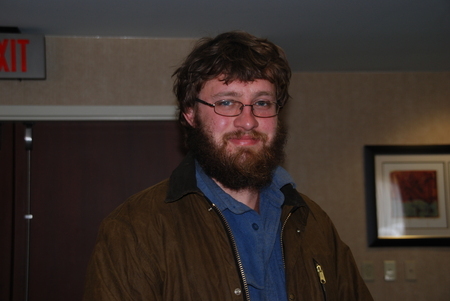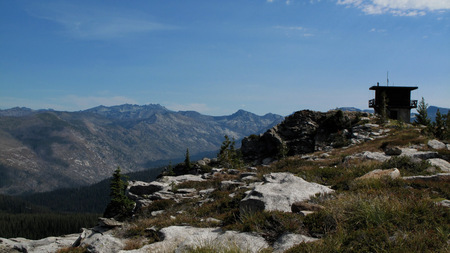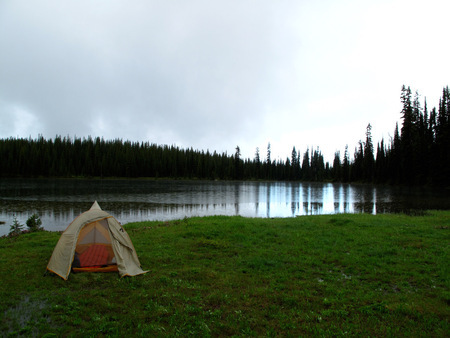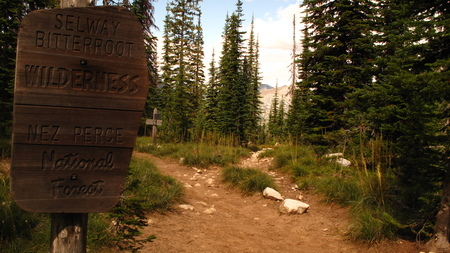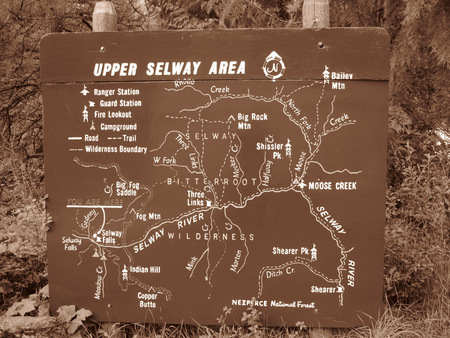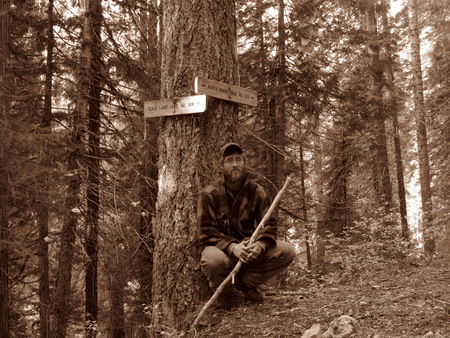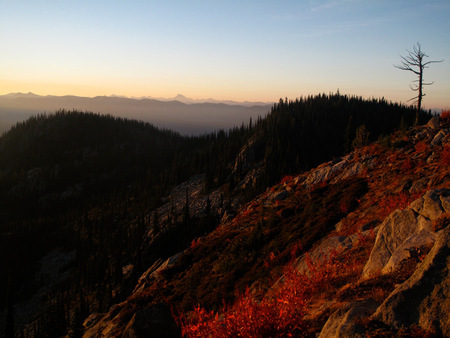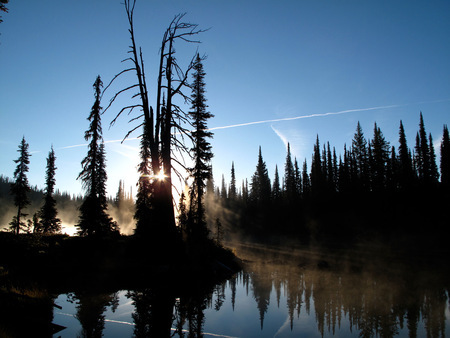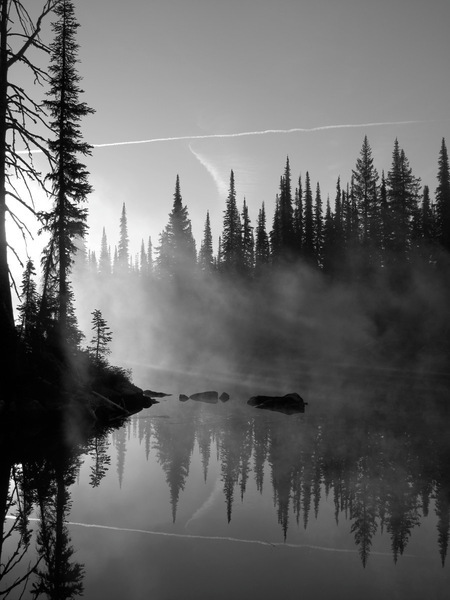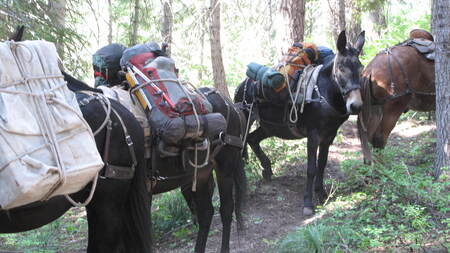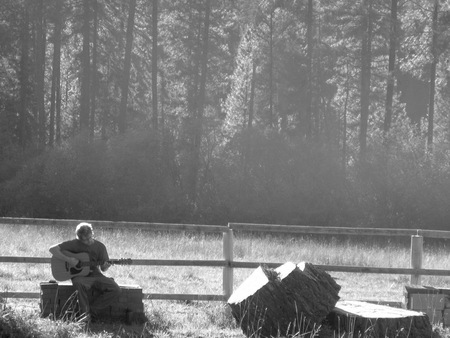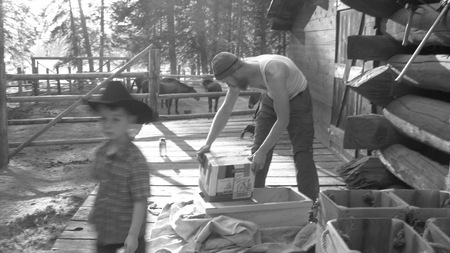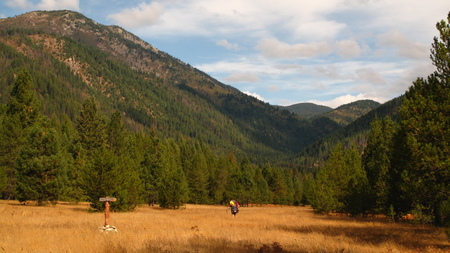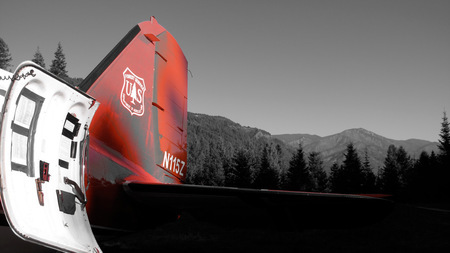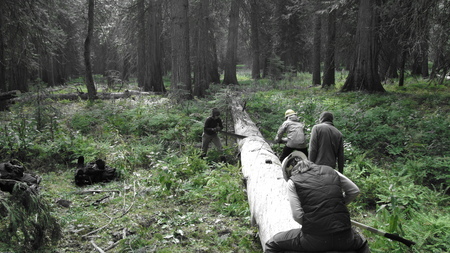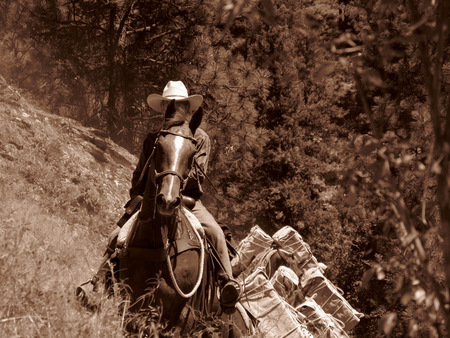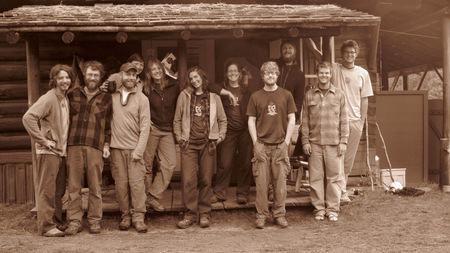Episode 11 : The Big Storm : an interview with Mark Bohrmann Item Info
In this episode, titled “The Big Storm,” we listen to Mack Bohrmann tell the story of a wilderness storm, one of many natural elements that users experience while out in the Selway-Bitterroot Wilderness. Mack was born and raised in Yarmouth, Maine, and moved out to Missoula, Montana in 2004 to attend the University of Montana, where he received a degree in Anthropology and Linguistics, and a minor in Natural Development Studies. Two months later, Mack found himself working for the Montana Conservation Corps, which is an AmeriCorps program, and was leading six people who had never been in the woods before, for six months in the Selway-Bitterroot Wilderness. Stories like Mack’s make up the backbone of the Selway-Bitterroot oral history, as they’re recounted again and again around campfires in the backcountry, and most people who have lived or worked in the wilderness quickly learn the value of telling a good story.
Episode 11 : The Big Storm : an interview with Mark Bohrmann [transcript]
00:00:00:00 - 00:00:29:15 Debbie Lee: Welcome to the Subway Bitterroot Wilderness History Project, which is made possible by a grant from the National Endowment for the Humanities. The University of Idaho, and Washington State University. Part of the project’s mission is to collect, preserve, and make public oral histories documenting the history and people of the subway. Bitterroot wilderness. For more information, please visit our website at SPW lib argue Idaho redo.
00:00:29:17 - 00:00:55:16 Mack Bohrmann: And then I think people, I think people get so much out of being in a wilderness setting once you take away cars and money and telephones. People are different and they are different to each other, I think. and and then they draw on things in themselves that maybe are a little rusty from our crazy life out here now.
00:00:55:18 - 00:01:25:14 Mack Bohrmann: I think the ways that people get along when they’re isolated in a place like that, that they place that they want to be, are really it’s a wonderful thing.
00:01:25:17 - 00:01:57:11 Debbie Lee: Thank you for joining us for the 11th episode of the Subway Bitterroot Wilderness History Project. In this episode, titled The Big Storm, we listen to Mac Baughman tell the story of a wilderness storm. One of the many natural elements that users experience while out in the Selway Bitterroot Wilderness. Mac was born and raised in Yarmouth, Maine, and moved out to Missoula, Montana in 2004 to attend the University of Montana, where he received a degree in anthropology and linguistics and a minor in Natural Development Studies.
00:01:57:13 - 00:02:17:12 Debbie Lee: Two months later, Mac found himself working for the Montana Conservation Corps, which is an AmeriCorps program and was leading six people who had never been in the woods before for six months in the Selway Bitter Wilderness. Stories like Mac’s make up the backbone of the subway Bitterroot oral history as they’re recounted again and again around campfires in the backcountry.
00:02:17:18 - 00:02:24:12 Debbie Lee: And most people who have lived or worked in the wilderness quickly learn the value of telling a good story.
00:02:24:14 - 00:02:47:03 Mack Bohrmann: And then you find yourself like writing letters at Moose Creek on a table, and you’re writing the same thing over and over again. Like this. I saw five bears. Like, I’m okay, though. Like bears aren’t scary, like in writing all this stuff. People who don’t have any idea. And I pictured, like, zooming out. Like there’s certain people here in Missoula who know wilderness is and know that I use cross cuts, not chainsaws.
00:02:47:03 - 00:03:13:13 Mack Bohrmann: Know why the people back in New England, where I’m from, like who have no idea about weather, has no idea about Idaho, and that’s like the hardest part about for her. For me, it was coming out both years was like all these crazy stories and like, not even stories is like feelings that like, I don’t know, feelings that just are the only way to feel at that point when you’re out there and then people like, come out like, so how was it?
00:03:13:14 - 00:03:32:03 Mack Bohrmann: You’re like, you can’t, I can’t put this in a tiny box for you. And the trying to put it in a tiny box undermines every aspect of why I go out there, because it’s like a all encompassing, pervasive thing in my life. But people like, oh, so like what happened? Like what would happen? Where were you on 4th of July?
00:03:32:03 - 00:03:55:25 Mack Bohrmann: I don’t know where I was on the 4th of July. Poorly working and have like so it’s good to have like that’s a negative side of people who were who do know a cross cuts are no wildernesses. The capitals of you and like so those are great people to talk to. And that’s what I realize are going into the woods is we don’t see a lot of people out there, but the people we do see out there are some of the most quality people.
00:03:55:27 - 00:04:06:11 Debbie Lee: So can you, think of any experiences where you’ve had to depend on people in ways that you don’t in the front country, or vice versa?
00:04:06:14 - 00:04:29:27 Mack Bohrmann: Well, yeah, definitely. Last year we were Isaac Lake and it was, what, July 31st and there hadn’t been a thunderstorm yet. And this is a long day for us. We started the East Eastmans, we hiked up Double Ridge and we’re just cutting trees and we’re going to camp at we’re Double Ridge. There’s this we look out there, but they just took the they took the lightning rod off it and it blew up.
00:04:29:27 - 00:04:57:02 Mack Bohrmann: There’s tons of glass all over the place. We were going to camp there, but like geographically, we looked at it and it’s kind of an abandoned East moose, not elbow bend, but like another bend. And all the weather that came that comes from the west, which is where the weather comes from. Just ran right into this ridge. And we decided that, like we heard on the radio, the lower level lightning activity level, all that stuff was telling us that probably better judgment than our camp at the spot.
00:04:57:02 - 00:05:28:27 Mack Bohrmann: Moving on. We moved on to this and ended up being like an eight mile day, but it was like the hardest day I’ve ever hiked. The group started off by like 20 300ft, went up to like 7000ft, and then down to like 6000ft. We’re hiking through snow at the end of it. Long day. And anyways, so let me show you Isaac Lake and, you know, just, we sit down, eat dinner, go to bed, like, just pragmatic, just like the turkeys get along best when they’re working hard.
00:05:28:27 - 00:05:52:11 Mack Bohrmann: Construction crews hate each other because they don’t move and they look each other all day. Cut and run. Crews move from cover ground to tired to argue. It’s a beautiful, beautiful thing. so yeah, we were just reveling in that. That we were just too tired to argue with each other. And, Yeah, like, just like, timing was impeccable, that it’s sort of drip, drip, drip draining.
00:05:52:11 - 00:06:10:08 Mack Bohrmann: We’re like, oh, well, here comes rain. Like whatever. And then the roll of thunder comes from the West, like, oh my God, here comes. And then I can’t, I wish I could draw, I wish I could, I can’t draw, I can’t, oh no I can’t paint. But like if I was artistic I would need to articulate this somehow.
00:06:10:08 - 00:06:32:29 Mack Bohrmann: That camping in Isaac Lake that night. And then he was hearing this, the cells move in. I said, oh, let me get in my tent with the cells were within five miles. But like, so where do you go? Like, I’ve actually done research because I’m afraid of lightning. And if I’m afraid of things, I’ve researched them. So I figured out, like, there’s, like the literature is there’s no safe place outside.
00:06:33:04 - 00:06:57:00 Mack Bohrmann: So I, it’s like, I would do it. I could just stay at trees, which are all similar size. And I watched about 100 yards away, lightning strike trees and like blowing up trees and like there’s blue green colors I’ve never seen with crazy colors. and this was, this was that like, I don’t know, like five cells came through and like, they would last like 15 minutes, half hour break, another cell would come through.
00:06:57:03 - 00:07:33:15 Mack Bohrmann: There’s a pattern of like the onset of the cell was like driving rain, hail, wind, sideways wind and like up and down wind and lightning. Every, like every five seconds would be conservative. I think there’s a lot of lightning. There’s like all the pent up energy from the whole season was just releasing in one storm. So like, I didn’t sleep very much that night and, but back to where this came from as the culture out there, usually we do check ins at 8:00, but like at 6:00 in the morning, we’re all like the ranger was at Moose Creek, was on a radio checking in with us because, you know, where we were taking the
00:07:33:15 - 00:07:44:07 Mack Bohrmann: other trail crew. But there is still no contact from Sizzler Lookout because like, where is Laura? Like, what is she doing up there? And as far as she gets on, like, Laura, how’s your night up there? And she Laura’s.
00:07:44:07 - 00:07:44:20 Debbie Lee: The lookout.
00:07:44:21 - 00:08:20:14 Mack Bohrmann: For us. Lookout officer. And she said at like 9 p.m., she got a call from Indian Hill Lookout, which is west of her, saying, Laura, get on your stool, turn off your radio. Her stool has glass on it and it’s like insulated, she said. Like all of a sudden sideways hail driving wind. She got out. She got on the stool or hair standing on end, and she was watching shooter azimuth azimuth in front of her, and she was watching electricity arc between everything buzzing animals, fire watching, ground strikes, just trying to right them on where they were.
00:08:20:14 - 00:08:42:03 Mack Bohrmann: She’s smoking cigarets because just do anything to make herself relax. And this was like all night. She didn’t sleep at all until the morning and but that was really cool. Like you get on a radio and like, everyone’s like, looking out, like everyone’s really worried. Everyone’s like, that was a hell of a storm. People in Missoula saw it and it was, I don’t know.
00:08:42:05 - 00:08:54:19 Mack Bohrmann: And the whole next morning, everyone’s like, hung over from like, thunder and lightning not sleeping. Even the animals were going out and like, it was such a weird day we just had. Then the fire hits a little early. Went back to the station for 4th of July.
00:08:54:21 - 00:08:55:25 Debbie Lee: So you do know where you.
00:08:55:25 - 00:08:59:17 Mack Bohrmann: Are on the. I do know where I was on 4th of July.
00:08:59:20 - 00:09:04:25 Debbie Lee: Wow. So were you thinking that’s going to be a lot of trail to clear.
00:09:04:26 - 00:09:18:17 Mack Bohrmann: Yeah. But, mostly I was thinking about myself at that point and, it definitely was a lot of like a, the, a paradigm shift. And I was like, what? Like sitting on my I was like, everything I got in my tent. No, I don’t want go in my tent. What are the odds of being struck by lightning?
00:09:18:17 - 00:09:36:17 Mack Bohrmann: I was like, odds like, no idiot has been where I am right now. I was like, there’s no way you can deduce odds. And like I figured out, the odds are like 1 in 700,000 of being struck by lightning. But like, no one was camp basically in Isaac Lake, up at 6000ft in a lightning storm. No, there’s no that was actually really good.
00:09:36:17 - 00:09:51:27 Mack Bohrmann: Thought that was a really good epiphany for me. It was like, you know, no one’s been here and I’ve been in a lot of places where no one’s been, and people have been a lot of us where I haven’t been. So, like, probability needs to be taken with a grain of salt, like, look where you are and like, look at the numbers of what’s happening, where you are.
00:09:52:01 - 00:09:56:13 Debbie Lee: Yeah. Well.
00:09:56:15 - 00:10:23:15 Debbie Lee: Thank you for joining us for this episode of the Selway Bitterroot Wilderness History Project, which has been made possible by the National Endowment for the Humanities. The University of Idaho, and Washington State University. The project coordinator is Debbie Lee, recorded and produced by Aaron Jepson.
Gallery
- Title:
- Episode 11 : The Big Storm : an interview with Mark Bohrmann
- Creator:
- Debbie Lee; Mack Bohrmann
- Date Created (ISO Standard):
- 2011-04-20
- Description:
- Interviewee: Mack Bohrmann | Interviewer: Debbie Lee | Location: Missoula, MT | Date: April 20, 2011 | In this episode, titled 'The Big Storm,' we listen to Mack Bohrmann tell the story of a wilderness storm, one of many natural elements that users experience while out in the Selway-Bitterroot Wilderness.
- Subjects:
- podcasts storms personal recollections americorps
- Section:
- Wilderness Voices
- Location:
- Selway-Bitterroot Wilderness (Idaho and Mont.)
- Publisher:
- Wilderness Voices, The Selway-Bitteroot Wilderness History Project, https://selwaybitterrootproject.wordpress.com/
- Original URL:
- https://selwaybitterrootproject.wordpress.com/2011/07/28/the-big-storm/
- Source Identifier:
- Selway-Podcast-ep11
- Type:
- Sound
- Format:
- audio/mp3
- Language:
- eng
- Preferred Citation:
- "Episode 11 : The Big Storm : an interview with Mark Bohrmann", The Selway-Bitterroot Wilderness History Project, University of Idaho Library Digital Collections, https://www.lib.uidaho.edu/digital/sbw/items/sbw293.html
- Rights:
- Copyright: The Selway-Bitteroot Wilderness History Project. In Copyright - Educational Use Permitted. For more information, please contact University of Idaho Library Special Collections and Archives Department at libspec@uidaho.edu.
- Standardized Rights:
- http://rightsstatements.org/vocab/InC-EDU/1.0/

